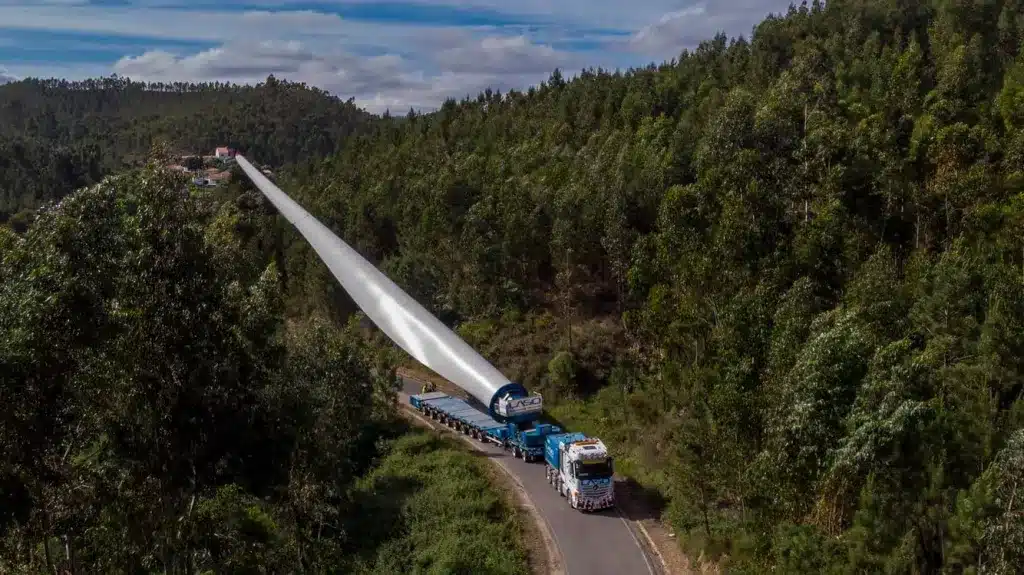“Portugal’s grid already stretched thin by renewables”, say critics
Just days after the official release of the Environmental Impact Assessment (EIA) Scope Proposal for yet another wind farm project in the Sotavento (eastern Algarve), a wave of outrage has broken as local residents, and environmental groups, believe “another example of greenwashed ambition trumping environmental responsibility and public interest” is being foisted upon them.
It doesn’t help that public consultation for this proposed battalion of 14 giant wind turbines along with a high-voltage transmission line, is only open until May 20. Environmental group Aware Algarve says it is critical that people submit objections quickly.
The proposal, by Portuguese-Dutch consortium Madoqua IPP, outlines “clean energy goals aligned with Portugal’s carbon neutrality ambitions”, but critics led by Aware Algarve, are not buying it. They consider the project “deeply flawed, and potentially disastrous”.
“This is not climate leadership — it’s corporate greenwashing backed by state silence,” said the group in a press release today “They are pushing industrial infrastructure into ecologically critical zones, without fixing the grid that already failed us just days ago.”
The proposed wind farm borders multiple Natura 2000 sites, including ZEC/ZPE Caldeirão, home to protected bird species, including critically-endangered eagles. According to the project’s own technical annex, over 50% of the original wind turbine positions had to be scrapped due to proximity to high-risk bird areas — yet the remaining locations still lie dangerously close to critical habitats.
Even more alarming, biodiversity monitoring is still incomplete. Despite this, the developer is moving ahead with the proposal, assuming future studies will support the current layout — a gamble with irreversible consequences, says Aware Algarve: “You don’t put turbines first and ask nature to adjust later.”
The proposal also underestimates the noise and visual impact on nearby rural communities, says the group, various members of which rely on tourism and sustainable agriculture.
“Locals fear that the massive 175-meter rotors — part of wind turbines with an overall structure reaching approximately 200 meters in height, taller than most Lisbon skyscrapers — will turn their landscape into an industrial zone”, a source adds – pointing out that construction and maintenance of the wind farm “will require the use of already fragile rural roads, which could be devastating to our cars and to agricultural equipment.
“The increased traffic and heavy machinery will almost certainly lead to road deterioration, making daily transportation to work, schools, and farming activities more difficult and costly for all of us.
“In fact, the last Cachopo wind farm development completely destroyed both the Tavira–Cachopo road and the Santa Catarina da Fonte do Bispo–Alcaria road, which took years to repair. These kind of issues isolate communities and impact on their livelihoods. They also create fire risks, as seen during the 2012 wildfires, where inaccessible terrain and poor road conditions severely hindered emergency response efforts”.
In short, with an Algarve that is increasingly vulnerable to climate-induced wildfires, compromised infrastructure could pose life-threatening consequences.
As for the “promises of local job creation and economic revitalisation”, Aware Algarve says “the proposal offers no clear long-term benefits to the communities it affects. Most jobs will disappear after construction, and there is no local energy pricing relief, grid co-ownership, or reinvestment guarantees”.
“They Profited. We Paid”.
Aware Algarve has done its homework. It says that energy companies operating in the region, including the developers of wind farm projects, are essentially pocketing the profits from Portugal’s green transition, without putting in any of the legwork.
“Despite years of subsidies, green energy contracts, and premium billing structures, critical infrastructure has been left outdated, under-resourced, and unprepared for the fluctuations inherent in renewable energy generation.
“We’ve paid our bills, paid our taxes, and paid for their solar and wind expansions. But when the grid collapsed, we were left in the dark — literally and figuratively,” says the group.
“How do you convince investors and citizens to back a clean energy transition if it shuts down airports, crashes digital services, and leaves families powerless for hours? Portugal’s grid is already stretched thin by the renewables we have. Adding capacity without stability is a recipe for future failures.
“Portugal’s blackout on Monday should kill off one dangerous myth: that clean energy alone is enough. It is not. The planet doesn’t just need green power. It needs a grid that’s smart, stable, and built for chaos”.
It goes without saying that Aware Algarve is “demanding that Madoqua IPP withdraw its proposal” which it stresses “barely addresses grid resilience”.
To access the public consultation process, click here. ND




















